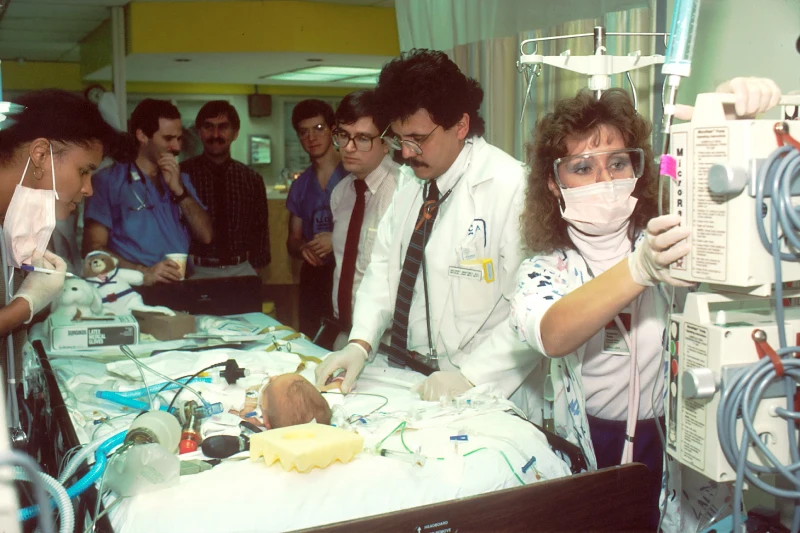The Benefits of a Career in Healthcare
10 min read
When it comes to choosing a career, there are many factors to consider. You want a job that will pay enough to allow you to live comfortably, a job that can offer stability. You also want to choose a path where there is room for progression, and most importantly, a career that you are passionate about and can be proud of. While there are numerous career paths to choose from, working in healthcare can be an incredibly fulfilling direction to take. If you have been thinking about whether or not to pursue a healthcare career but aren’t sure if it will be right for you, below are some great benefits to this kind of career that might help persuade you to pursue one.
There are many benefits to a career in healthcare. Here are a few examples:
- Job security: The demand for healthcare professionals is expected to grow in the coming years, so there will be a steady demand for qualified workers in this field.
- Personal fulfillment: Many people find great satisfaction in helping others and making a difference in the lives of their patients.
- Competitive salaries: Healthcare jobs often come with competitive salaries, particularly for those with advanced degrees or specialized training.
- Opportunities for advancement: There are many different paths you can take in the healthcare field, and there are many opportunities for advancement and professional development.
- Flexibility: Many healthcare jobs offer flexible schedules and the ability to work part-time or on a per-diem basis.
- Variety: There are many different types of healthcare jobs, so you can choose a role that aligns with your interests and skills.
- Collaborative environment: Healthcare professionals often work as part of a team, which can be rewarding and help you learn from your colleagues.
Table of Contents
There is a Lot of Variety

When thinking about a healthcare career, the first roles that come to mind might be a doctor, nurse, or another patient-facing job. These are very popular choices for those who are seeking a job in the healthcare sector, but there are far from being the only options available to you.
Take the time to look into the various career paths that you could follow in healthcare before you make your decision – you might be surprised to find a role that you never knew about that would be perfect for you.
There is a lot of variety in healthcare careers. Some people choose to work directly with patients, while others work behind the scenes in roles such as administration or research.
Here are a few examples of the types of healthcare careers that are available:
- Doctors: Physicians diagnose and treat illnesses, injuries, and other health conditions.
- Nurses: Nurses provide care and support to patients, working alongside doctors and other healthcare professionals.
- Pharmacists: Pharmacists dispense medications and advise patients on how to use them safely and effectively.
- Dentists: Dentists diagnose and treat oral health problems, including cavities, gum disease, and tooth loss.
- Physical therapists: Physical therapists help patients recover from injuries and manage chronic conditions by using exercises and other techniques to improve mobility and reduce pain.
- Occupational therapists: Occupational therapists help people with disabilities or injuries learn or relearn the skills they need to perform everyday tasks and activities.
- Psychologists: Psychologists use various techniques to help people understand and cope with mental health issues and emotional problems.
- Health educators: Health educators teach people about healthy behaviors and how to prevent and manage diseases.
These are just a few examples of the many careers that are available in the healthcare field.
Plenty of Opportunities to Learn

Technically, any career path can provide you with opportunities to learn, but some will require you to have a particular knowledge more than others. For most roles in healthcare, you will need to have a college degree in a relevant field to get considered for even entry-level roles, so if you are someone who loves to learn and you’re up for this challenge, it could be an ideal career to pursue.
Online degree programs are available and offer the same quality of education but with much more flexibility. You can click here to see an example of an online nursing degree if this is a job you’re interested in pursuing or search for other courses that are more relevant to your ambitions in healthcare.
There are plenty of opportunities to learn and grow in a career in healthcare. Many healthcare professionals continue their education throughout their careers in order to stay up-to-date on the latest techniques and technologies.
Here are a few ways that healthcare professionals can continue learning:
- Professional development courses: Many healthcare organizations offer professional development courses to help their employees stay current in their field.
- Continuing education: Many professional organizations and licensing bodies require healthcare professionals to complete a certain number of continuing education credits each year.
- Degree programs: Some healthcare professionals choose to return to school to earn advanced degrees, such as a master’s or doctoral degree.
- Certifications: Many healthcare professionals pursue certifications in specialized areas, such as advanced cardiac life support or gerontological nursing.
- On-the-job training: Many healthcare jobs come with on-the-job training, which can be an excellent way to learn new skills and techniques.
Overall, the healthcare field is constantly evolving, and there are many opportunities for professionals to learn and grow throughout their careers.
It’s Rewarding

No matter what path you choose to pursue in healthcare, every single role within the industry is invaluable and does something to contribute to the progression of medicine and treatments all over the globe. Whether it’s a patient-facing role, research, or helping to manage healthcare centers, all of these things are essential elements that keep the healthcare system moving forward. This is an incredible thing to be a part of, which makes healthcare jobs very rewarding. You can take pride in knowing that every day you help make things a little bit better for other people and enjoy your career.
There are many reasons why nursing can be a rewarding career choice. Nurses have the opportunity to make a positive impact on the lives of others and play a vital role in the healthcare system. They may work with people of all ages and from all walks of life, and they often form strong connections with their patients and their families. In addition, nursing is a field that is constantly evolving, and there are many opportunities for personal and professional growth.
A career in healthcare can be extremely rewarding. Many people find great satisfaction in helping others and making a difference in the lives of their patients. Some specific ways that a career in healthcare can be rewarding include:
- Making a positive impact: By providing care and support to patients, healthcare professionals can make a positive impact on the lives of others.
- Seeing the results of your work: In healthcare, you often have the opportunity to see the results of your work firsthand. This can be particularly rewarding when you are able to help a patient recover from an illness or injury, or manage a chronic condition.
- Building relationships: Healthcare professionals often develop close relationships with their patients and their families. These relationships can be very rewarding and can provide a sense of purpose and connection.
- Being part of a team: Many healthcare professionals work as part of a team, which can be rewarding in itself. Working with others who are dedicated to helping others can be a very fulfilling experience.
- Providing comfort and support: One of the primary roles of healthcare professionals is to provide comfort and support to patients and their families. This can be a very rewarding aspect of the job.
Overall, a career in healthcare can be incredibly rewarding for those who are passionate about helping others and making a positive difference in the world.
Career Stability

One of the main things people are concerned about when it comes to their careers is how stable it is. There are a lot of exciting career paths out there, but not all of them can guarantee that they will be there for you ten years down the line. A lot of the time, this is due to consumer demand and the ever-changing landscape of society, what is currently on-trend, and so on.
Yes, these careers might sound exciting and appealing at the time, but no one wants to put years of hard work into a role only to find that it has become irrelevant and that they have to retrain for something else. While healthcare might not sound as glamorous as other pursuits, these jobs will always be necessary, with perhaps even new roles being formed as the industry develops. If you want to make sure your career is stable, healthcare is one of the most stable industries you can get into.
A career in healthcare can offer a good deal of stability. The demand for healthcare professionals is expected to grow in the coming years, so there will be a steady demand for qualified workers in this field. According to the Bureau of Labor Statistics, employment in healthcare occupations is projected to grow 4% from 2019 to 2029, which is faster than the average for all occupations.
Some specific healthcare occupations that are expected to have particularly strong job growth include:
- Personal care aides
- Home health aides
- Physician assistants
- Nurse practitioners
- Physical therapist assistants
- Occupational therapy assistants
- Dental hygienists
Overall, the healthcare field is expected to be a stable and growing sector, offering a wide range of career opportunities for those who are interested in this type of work.
Demand

As well as having comfort knowing your job will last, another perk of going into healthcare is that there is usually a consistently high demand for people in various roles. After taking the time and energy to complete your studies, you want to know that you can get your foot on the ladder career-wise and not have to spend years waiting around just to get an entry-level role. Although there might be a lot of competition for the role you’re interested in, there will be plenty of job opportunities available to you, so if you are an excellent candidate, you shouldn’t have to wait long before starting your healthcare career.
Another great benefit of a career in healthcare. As I mentioned earlier, the demand for healthcare professionals is expected to grow in the coming years, so there will be a steady demand for qualified workers in this field. This means that you can have confidence that there will be job opportunities available in your field, regardless of economic conditions or other external factors.
In addition to the overall demand for healthcare workers, there is also a high demand for workers in certain healthcare roles. For example, there is currently a shortage of primary care doctors in many parts of the country, so there is a particularly high demand for doctors who are trained in primary care. Similarly, there is a growing demand for home health aides, as more people are opting to receive healthcare services in their homes rather than in hospitals or other institutional settings.
Overall, a career in healthcare can offer a good deal of stability and the comfort of knowing that your job will likely be in demand for the foreseeable future.
Good Salary

Healthcare jobs often come with competitive salaries, particularly for those with advanced degrees or specialized training. According to the Bureau of Labor Statistics, the median annual wage for healthcare occupations was $45,710 as of May 2020. However, wages can vary significantly depending on the specific job and the level of education and experience required.
For example, physicians and surgeons tend to have some of the highest salaries in the healthcare field, with a median annual wage of $208,000 as of May 2020. Other high-paying healthcare occupations include dentists, pharmacists, and advanced practice nurses (such as nurse practitioners and clinical nurse specialists).
Even entry-level healthcare jobs can be well-paying. For example, the median annual wage for nursing assistants was $30,720 as of May 2020, and the median annual wage for home health aides was $25,280.
Overall, the healthcare field offers a wide range of salaries, with many positions offering competitive pay and the potential for salary increases as you gain experience and education.
It’s Challenging

It’s important to be challenged by your job role rather than working in a position where you coast along and have no opportunity to grow. Again, some roles in healthcare will be more challenging than others, but all of them will give you the chance to build your skill set and move forward in your career. If you’re looking for a job that will push you, this is an excellent industry to get involved with.
With so many roles in healthcare that are available, finding a career path that suits you shouldn’t be too difficult. If you have been thinking about getting into healthcare but have been unsure, hopefully, these benefits will convince you that it is worth pursuing.
A career in healthcare can be challenging in a number of ways. Here are a few examples:
- Emotional challenges: Working in healthcare can be emotionally challenging, as you may encounter patients who are dealing with serious illnesses or injuries, or who are experiencing a great deal of stress or emotional distress. It can be difficult to witness patients in difficult situations and to provide support to them and their families.
- Physical challenges: Some healthcare jobs can be physically demanding, particularly those that involve lifting or moving patients, standing for long periods of time, or performing procedures that require a high level of manual dexterity.
- Intellectual challenges: Healthcare professionals are expected to have a deep understanding of complex medical concepts and procedures, and they must be able to apply this knowledge to diagnose and treat patients. This can be challenging, particularly for those who are just starting out in the field.
- Time management challenges: Healthcare professionals often work long hours and may have to be on call during evenings and weekends. It can be challenging to manage your time effectively and balance your work responsibilities with your personal life.
- Regulatory challenges: Healthcare professionals must adhere to a complex set of regulations and guidelines in order to ensure that they are providing high-quality care to their patients. This can be challenging, particularly for those who are new to the field and are learning about these regulations for the first time.
Despite these challenges, many people find a career in healthcare to be extremely rewarding and worthwhile.






